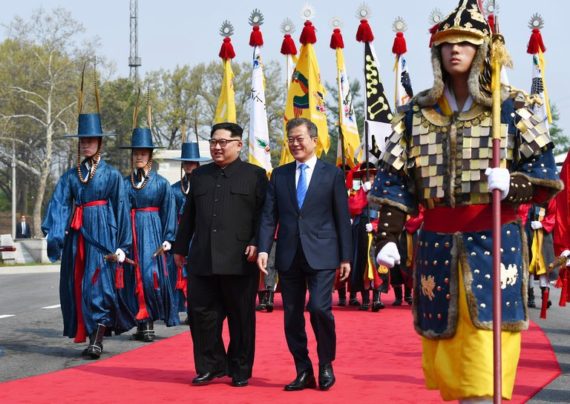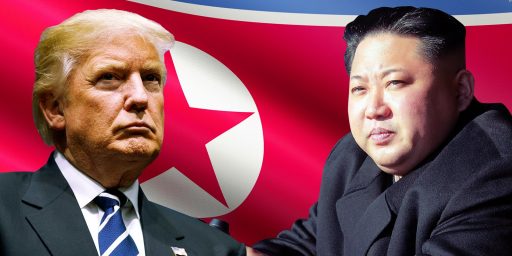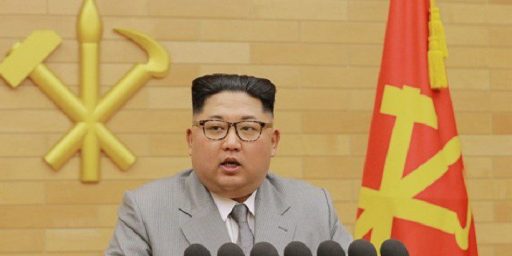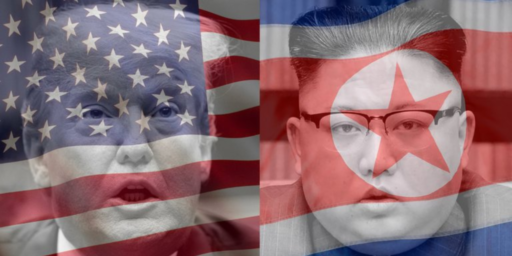Leaders Of North And South Korea Meet, But Many Questions Remain Unanswered
The meeting between Kim Jong-Un and Moon Jae-In was historic, but many questions and caveats remain.

The leaders of North and South Korea met today in what many are calling a historic meeting that will have a long-term positive impact on the peninsula, but there’s much that still remains uncertain:
SEOUL, South Korea — The leaders of North and South Korea agreed on Friday to work to remove all nuclear weapons from the Korean Peninsula and, within the year, pursue talks with the United States to declare an official end to the Korean War, which ravaged the peninsula from 1950 to 1953.
At a historic summit meeting, the first time a North Korean leader had ever set foot in the South, the leaders vowed to negotiate a treaty to replace a truce that has kept an uneasy peace on the divided Korean Peninsula for more than six decades, while ridding it of nuclear weapons. A peace treaty has been one of the incentives North Korea has demanded in return for dismantling its nuclear program.
“South and North Korea confirmed the common goal of realizing, through complete denuclearization, a nuclear-free Korean Peninsula,” read a statement signed by North Korea’s leader, Kim Jong-un, and the South’s president, Moon Jae-in, after their meeting at the border village of Panmunjom.
The agreements came at the end of a day of extraordinary diplomatic stagecraft emphasizing hopes for reconciliation and disarmament that was broadcast live around the world, beginning with a smile and handshake that Mr. Kim and Mr. Moon shared at the border and extending to a quiet, 30-minute talk they had near the end of the day in a wooded area of the village.
Their meeting was marked by some surprisingly candid moments but also sweeping pledges, with Mr. Kim declaring, “I came here to put an end to the history of confrontation.”
The event, at the Peace House, a conference building on the South Korean side of Panmunjom, was closely watched because it could set the tone for the even more critical summit meeting between President Trump and Mr. Kim, two leaders known for bold, if unpredictable, actions who put the world on edge last year with threats of a nuclear war.
The Trump administration has tightened sanctions on North Korea with China’s help and, mindful that the North has failed to deliver on its promises in the past, insisted that Mr. Kim make substantial progress dismantling his nuclear arsenal before the “maximum pressure” campaign is eased.
But by agreeing to pursue a peace deal this year, Mr. Moon held out the prospect of progress toward one of North Korea’s top goals before the North has given up its nuclear weapons, and perhaps measures to withdraw troops from inside the Demilitarized Zone, the heavily armed buffer area between the two Koreas, and create a joint fishing zone around the disputed western sea border, a scene of bloody naval skirmishes between the two Koreas.
Mr. Moon also dangled an economic carrot, reaffirming promises made in the past by the South of huge investments to help improve the North’s road and train systems. But those agreements collapsed as the North persisted in developing nuclear weapons, and Mr. Moon’s aides have said that such assistance can only come after the North makes progress toward denuclearization and sanctions are lifted.
In Washington, Mr. Trump signaled his support of Mr. Moon’s position, writing early Friday on Twitter: “Good things are happening, but only time will tell!” Fifteen minutes later, he declared in an all-caps tweet, “KOREAN WAR TO END!” and said that all Americans should be “very proud” of what was taking place on the Korean Peninsula.
In a later message, he thanked President Xi Jinping of China for his “great help” in the process.
China’s state news media played the summit meeting prominently, even though China had been left on the sidelines with little influence over the proceedings. The Chinese Foreign Ministry praised the courage of the two Korean leaders, and said it welcomed “the new journey” for peace on the Korean Peninsula.’
(…)
An armistice brought about a cease-fire to the Korean War in 1953, but the conflict never officially ended because the parties could not agree to a formal peace treaty. They would have to overcome significant obstacles to do so now, including China’s likely demand that American troops leave South Korea.
In their joint statement, the two Korean leaders said that within a year, they would push for a trilateral conference with the United States, or a four-party forum that also included China, with the aim of “declaring an end to the Korean War” and intentions to “replace the armistice with a peace treaty.”
Mr. Kim and Mr. Moon also agreed to improve inter-Korean relations by opening a liaison office in the North Korean border town of Kaesong and arranging a reunion later this year of families separated by the war. And they said Mr. Moon would visit Pyongyang in the fall.
Mr. Moon, a progressive leader who says he likes to see South Korea “in the driver’s seat” in pushing the peace effort forward, is trying to broker a successful summit meeting between Mr. Kim and Mr. Trump, which is expected in late May or early June.
Mr. Kim rattled the region last year by testing long-range missiles and trading threats of nuclear war with Mr. Trump. But then he abruptly shifted gears, saying he was willing to give up his nuclear weapons for the right incentives and proposing the meeting with Mr. Trump.
Last weekend, Mr. Kim announced an end to all nuclear and long-range-missile tests, saying that his country had mastered how to mount nuclear warheads on missiles and no longer needed to conduct tests. Mr. Kim said North Korea had adopted a “new strategic line” focusing on economic development.
All of this comes at the end of a whirlwind four-month period that has seen what appears to be some real change on the Korean Peninsula. It all began, of course, with Kim Jong Un’s New Year’s Day address during which he extended an olive branch to the Republic of Korea. For the most part the speech was filled with broad generalities regarding a more peaceful relationship with the Republic of Korea, however, Kim was specific regarding at least some of what he had in mind. This included small items such as North Korean participation in the then-upcoming inter Olympics It was based on this speech that we saw the first joint talks between the two nations in nearly a decade. The immediate results of these meetings included the re-establishment of a military hotline between the two countries that the North Koreans had shut down during one of the many periods of confrontation between the two nations. There was also an agreement that allowed North Korean athletes to compete in the Olympics and a joint women’s hockey team during the games. Additionally, the DPRK was represented at the Opening Ceremonies by a delegation led by Kim Jong Un’s sister and during the Closing Ceremonies by a delegation led by a top General.
Beyond these somewhat symbolic moves, there were also plenty of surprising developments at a more substantive level. The most significant, of course, is the announcement that President Trump had accepted an invitation to meet with Kim Jong Un sometime later this year, with some speculation that it could take place as early as May although it now appears that June or later in the summer may be a more likely date. That announcement came at the same time that it was reported that Kim Jong Un had stated that he would accept the idea of denuclearization as a goal of such talks, although it isn’t entirely clear that the North Korean idea of “denuclearization” is anywhere close to what the Trump Administration has in mind. In the midst of all of this, Kim spent several days in Beijing meeting with Xi Jinping and other Chinese officials. As I said in my post on that meeting, it seems clear that the purpose of that meeting was to reassure Kim that, despite recent years in which China appeared to be losing patience with the Kim regime, China still had his back and to reassure the Chinese that Kim was not about to spin out of China’s orbit. Finally, just days before today’s meeting with his South Korean counterpart, Kim Jong Un announced that the DPRK was halting its nuclear and ballistic missile testing programs, although the announcement stated that this was being done because the nation had reached the point of having a viable deterrent force, not as a concession on the diplomatic front.
While all of these developments, and the announcements coming out of today’s meeting, are encouraging it’s worth being cautious and circumspect about what’s actually going on here. Despite all the headlines, there’s still no real indication that the DPRK is ready or willing to give up its nuclear weapons program, or that it is willing to make any real concessions on the military front that would go a long way toward reducing tensions on the Peninsula and reducing tension with the United States, South Korea, and other neighbors such as Japan. Indeed, if the North Koreans have learned anything from recent history, specifically the examples of Libya and Iraq in particular, it is that nations that give up their WMDs end up eventually becoming targets, with their leaders often disposed of in the most violent of manners. Given that, the idea that the DPRK would give up the only things preventing more powerful nations from deposing its leadership seems at first glance to be utterly absurd. This is important, of course, because the clear goal of any future talks for the United States clearly seems to be the idea that the DPRK would not only halt its research programs but also turn over all its WMD weapons and technology. If that’s how we end up approaching the upcoming talks and an eventual summit meeting between Kim and Trump, then there’s unlikely to be a success from the American point of view.
Another potential risk to keep in mind is the possibility that there could be an as yet unseen trap awaiting the United States in these upcoming talks. One of the most significant of these is the risks is the possibility that all of this could be part of an effort by the North and, possibly, by its patron in Beijing to drive a wedge between the United States and South Korea. No doubt, for example, much of what was announced out of today’s meeting between Kim Jong Un and President Moon will play well among a South Korean population that voted Moon into office in no small part because of his pledge to help reduce tensions on the peninsula. The messages of mutual goodwill and additional future meetings between the two nations will go a long way toward accomplishing that goal, but they do little to advance the arguably quite different goals that the United States has in mind when it comes to talks with the DPRK. If those talks end badly, or without any real agreement, then the North will no doubt seek to blame the United States, and this could have an impact on the domestic population in South Korea and on South Korean political leaders in a way that could make our position in Asia far more difficult to manage.
So, while there’s much to be hopeful about there’s also much to be skeptical about. So far, Kim Jong Un has seemingly given in on things that many thought the North Koreans would never give in on. The idea that they aren’t looking for something in all of this is too absurd to be believed. The question is, what exactly are they looking for?






Just on the pic, not the story…
Historic Korean costumes are bad-ass!
My guess is that at a minimum Kim will insist on keeping whatever nuclear weapons and missiles he has, and he may offer a freeze on further weapons development (but not necessarily further missile development). If he’s willing to give up his nukes, he’ll demand America withdraw its forces from South Korea and Japan.
I won’t hazard even a guess as to what trump will propose or how he’ll react, because it’s not possible to rationally estimate irrational whims.
If North Korea, South Korea, and China are all playing some footsie under the table and pandering to Trump to somehow swipe US power away, I wouldn’t worry much. Let Trump think he’s the one responsible.
My own feeling is now that Kim has stabilized his regime, he’s looked at the hole-in-the-ground that used to be the Nork testing site, looked at the Nork economy, and realized that the latter is about to totally implode unless he gets rid of some of those sanctions and somehow improves the economy. Hence the sweet-talking. The Chinese are antsy that the border between themselves and NKor will collapse, sending hordes of starving individuals across into China, so are happy to nudge in happy-sounding directions, especially if they can undercut the U.S. And the South Koreans are sick and tired of the entire situation, don’t trust the U.S. that much any more and want to fix things.
So the long-frozen ice has been breaking up and things are moving. Trump and his comments will be used by all sides as a flag to point in whatever direction they desire, but contrary to Cadet Bonespur’s belief, he actually has very little to do with the situation.
A side note, to be sure, but Trump does use the word “proud” in the most bizarre ways. He said the American people were “proud” to be saying “Merry Christmas” again. He said his plan for DACA would make Americans “happy and proud.” He said he was “proud” Obama released his birth certificate. Now he said we’re “proud” the Korean War might be ending.
Most likely they look for an end to being America’s excuse for every hare-brained military budget Washington can conceive.
I’m skeptical but we’ll see where this goes. I would like to believe that Kim isn’t completely crazy and maybe sees a better way here. But we’ve down this road before with NK. I won’t believe it until real progress is made.
Trump can claim credit if he wants (the Trumpers are already saying he should win the Nobel Peace Prize). I guess he’s been acting so nutty, the Koreas decided it would be best to cut him out and deal with each other. But … I will give him one piece of credit. Perhaps his willingness to do Things That Are Not Done — like meet with Kim — is helping. The Washington consensus isn’t alway right.
Time will tell.
Kim has gotten nukes (which he will never, ever, ever give up, regardless of nebulous gestures toward “denuclearization”) and elevation to peer status with Moon and possibly Trump. For this, he has given up exactly nothing. He may give up further nothing in exchange for relaxation of sanctions. Trump is being played by both Kim and Moon as they make sure to stroke his bloated pig of an ego with exaggerations of his influence in this whole process. The future may bring a withdrawal of US forces from Korea and the tremendous decline in American influence in Asia that would signify.
But at least we won’t blunder into a second Korean War and the piles of corpses that would result.
I just don’t see what the end game is: is it a reunified Korea? China won’t allow that, I wouldn’t think, unless it’s a reunified Korea led by the North.
I’m of the mind this is an effort to ease sanctions before things get even more horrible in N. Korea. Citizens starving and escapees laden with tapeworms do not make for a stable country. So they talk about talking, allow for some family reunifications (getting lots of nice media pictures and coverage) and some easing of sanctions, and then start slowly dialing back.
Relief from sanctions is a big part of the equation. NK is, arguably, the poorest country in the world at this moment and closing Gaeseon Industrial Area didn’t help the economic balance and may have hurt Kim’s hard currency situation as much as the sanctions do. Moon, who my Korean friends identify as the furthest left option available at the moment, is certainly amenable to a Korea less culturally dominated and militarily supported by the US, but certainly also realized that unification is a burden that the South cannot carry at this time. I didn’t see any indications while I was there recently that China is considered anything but an adversary in the South and there seem to be many in the South who believe that China seeks to annex Korea (this seems to be part of the history of the penninsula) and would use NK annexation as a wedge. Among people that I met and talked to, Trump’s reputation is that of the 80s building contractor, so they are not as jaded about him as people on the left are here.
I don’t see Kim as being willing to “denuclearize” in the sense that the West would define the term, and I also don’t believe that he would accept US assurances that everything would be just peachy under a Trump-inspired treaty. I also didn’t meet anyone with restored hopes for reunification because Moon was elected. That train seems to have left the station. Additional family reunification meetings would be a nice outcome of the Moon/Kim meetings (and good for Kim’s national treasury, assuming he doesn’t embezzle the money) but the reports I read did not mention that as an outcome. I won’t be surprised, as I have noted before, to see a unified action throwing both Trump and Xi under the bus as the “reasons” for failure if the negotiations don’t result in improved relations; although, I expect some sort of sanction relief/development aid in return for what Trump can call “denuclearization” for the drooling masses here. Bolton and Pompeo are the wild cards in the mix, and to use the old card game metaphor about the “mark”, Trump will need a mirror.